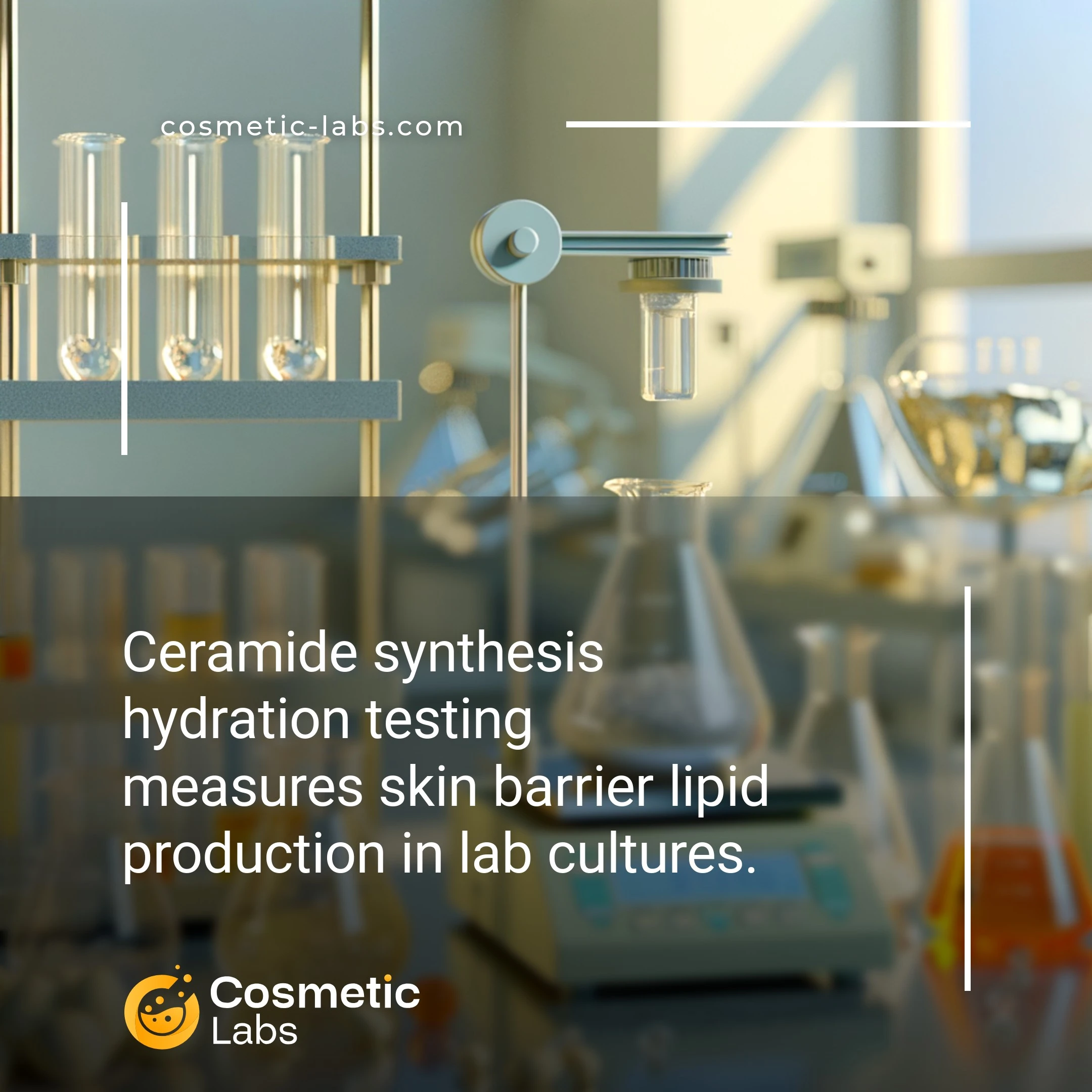Ceramide Synthesis Testing for Skincare Hydration Claims

What is Ceramide synthesis?
Ceramide synthesis hydration testing services evaluate how well cosmetic formulations can boost the skin’s natural ceramide production to improve moisture retention. Labs use in vitro keratinocyte cultures to measure ceramide levels before and after product application, tracking specific lipid markers like ceramide-3 and ceramide-6. This testing reveals whether your formulation actually stimulates the skin’s barrier repair mechanisms rather than just sitting on the surface—a key differentiator for premium skincare claims.
Why do you need this service?
Cosmetic labs use ceramide synthesis testing to validate moisturizer formulations before market launch, measuring skin barrier restoration and water retention rates across different age groups. Brand owners rely on these preclinical studies to support marketing claims about hydration benefits, while reducing reformulation costs by identifying optimal ceramide concentrations early in development.
Who provides Ceramide synthesis services?
All cosmetic labs providing Ceramide synthesis services
There is no company providing these services at the moment.
Ceramide Synthesis Testing for Hydration Efficacy
Ceramide synthesis testing measures how well cosmetic formulations stimulate natural ceramide production in skin cells. This specialized analysis goes beyond basic hydration testing by evaluating your product’s ability to strengthen the skin barrier at the molecular level.
In Vitro Ceramide Production Analysis
Labs use cultured keratinocytes to measure ceramide synthesis rates after product application. The process involves exposing skin cells to your formulation for 24-72 hours, then analyzing ceramide levels using liquid chromatography-mass spectrometry.
Key measurements include:
- Ceramide 1, 3, and 6 concentration changes
- Synthesis enzyme activity (serine palmitoyltransferase)
- Time-dependent production curves
- Dose-response relationships
This data helps you validate claims about barrier repair and long-term hydration benefits.
Biomarker Assessment for Barrier Function
Advanced testing protocols examine how ceramide synthesis affects overall skin barrier integrity. Labs measure transepidermal water loss alongside ceramide production to create a complete hydration profile.
Testing parameters include:
- Filaggrin expression levels
- Lipid bilayer organization
- Stratum corneum thickness
- Water retention capacity
These comprehensive assessments support clinical efficacy claims and help optimize formulation concentrations. Connect with specialized labs on our platform to discuss your ceramide synthesis testing requirements and timeline.
Applications of Ceramide Synthesis for Hydration Testing Services
Cosmetic labs use ceramide synthesis for hydration testing services to validate moisture barrier claims and optimize formulation performance across diverse product categories.
Anti-Aging Skincare Product Development
Labs synthesize ceramides to test how well serums and creams restore skin barrier function in aging skin models. These tests measure transepidermal water loss (TEWL) reduction and stratum corneum hydration levels over 24-48 hour periods. Ceramide synthesis testing helps brands prove their anti-aging formulas actually rebuild compromised skin barriers.
Testing protocols include ceramide 1, 3, and 6 synthesis pathways to evaluate which combinations deliver the strongest moisture retention. Labs can demonstrate up to 40% improvement in barrier function within 72 hours of application.
Sensitive Skin Product Validation
Ceramide synthesis testing validates gentle formulations designed for reactive and compromised skin types. Labs measure how products support natural ceramide production without triggering inflammatory responses. This testing proves formulas can restore barrier integrity while maintaining skin tolerance.
Test results show ceramide synthesis activity alongside irritation markers, helping brands position products for sensitive skin markets. Labs track both immediate hydration gains and long-term barrier repair over 14-day testing periods.
| Testing Parameter | Measurement Method | Typical Results Timeline |
|---|---|---|
| Ceramide Synthesis Rate | LC-MS/MS Analysis | 4-8 hours |
| TEWL Reduction | Evaporimeter Reading | 24-48 hours |
| Barrier Function Recovery | Tape Stripping Protocol | 72 hours |
| Hydration Retention | Corneometer Measurement | 2-14 days |
Ready to validate your hydration claims through ceramide synthesis testing? Contact specialized cosmetic labs on our platform to discuss your specific testing requirements and timeline.
